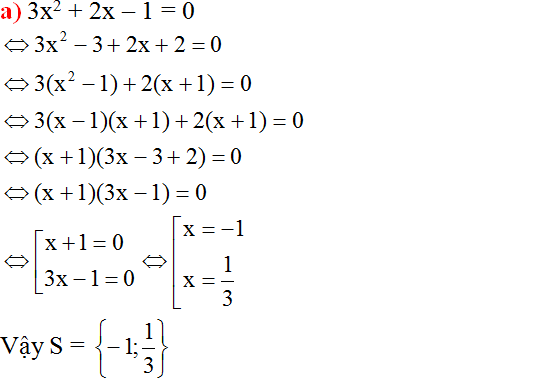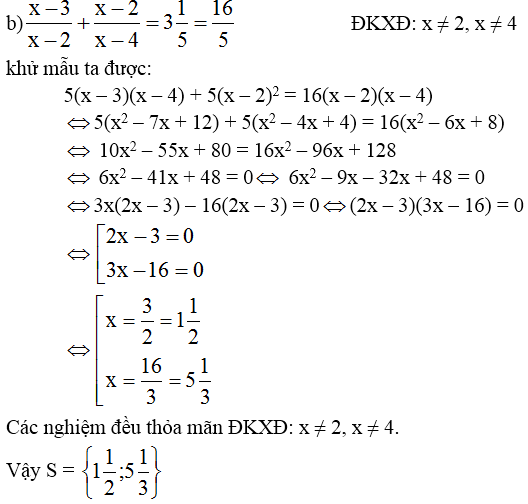Hãy nhập câu hỏi của bạn vào đây, nếu là tài khoản VIP, bạn sẽ được ưu tiên trả lời.

Câu 1a : tự kết luận nhé
\(2\left(x+3\right)=5x-4\Leftrightarrow2x+6=5x-4\Leftrightarrow-3x=-10\Leftrightarrow x=\frac{10}{3}\)
Câu 1b : \(\frac{1}{x-3}-\frac{2}{x+3}=\frac{5-2x}{x^2-9}\)ĐK : \(x\ne\pm3\)
\(\Leftrightarrow x+3-2x+6=5-2x\Leftrightarrow-x+9=5-2x\Leftrightarrow x=-4\)
c, \(\frac{x+1}{2}\ge\frac{2x-2}{3}\Leftrightarrow\frac{x+1}{2}-\frac{2x-2}{3}\ge0\)
\(\Leftrightarrow\frac{3x+3-4x+8}{6}\ge0\Rightarrow-x+11\ge0\Leftrightarrow x\le11\)vì 6 >= 0
1) 2(x + 3) = 5x - 4
<=> 2x + 6 = 5x - 4
<=> 3x = 10
<=> x = 10/3
Vậy x = 10/3 là nghiệm phương trình
b) ĐKXĐ : \(x\ne\pm3\)
\(\frac{1}{x-3}-\frac{2}{x+3}=\frac{5-2x}{x^2-9}\)
=> \(\frac{x+3-2\left(x-3\right)}{\left(x-3\right)\left(x+3\right)}=\frac{5-2x}{\left(x-3\right)\left(x+3\right)}\)
=> x + 3 - 2(x - 3) = 5 - 2x
<=> -x + 9 = 5 - 2x
<=> x = -4 (tm)
Vậy x = -4 là nghiệm phương trình
c) \(\frac{x+1}{2}\ge\frac{2x-2}{3}\)
<=> \(6.\frac{x+1}{2}\ge6.\frac{2x-2}{3}\)
<=> 3(x + 1) \(\ge\)2(2x - 2)
<=> 3x + 3 \(\ge\)4x - 4
<=> 7 \(\ge\)x
<=> x \(\le7\)
Vậy x \(\le\)7 là nghiệm của bất phương trình
Biểu diễn
-----------------------|-----------]|-/-/-/-/-/-/>
0 7

a) 4x - 5=0
\(\Leftrightarrow\)4x =5
\(\Leftrightarrow\) x =\(\dfrac{5}{4}\)
b) 2x + 1 = 7 - x
\(\Leftrightarrow\)2x + x = 7-1
\(\Leftrightarrow\)3x = 6
\(\Leftrightarrow\)x = 2

Câu 1: (3,0 điểm). Giải các phương trình:
a) \(3x+5=2x+2\).
\(\Leftrightarrow3x-2x=2-5\).
\(\Leftrightarrow x=-3\).
Vậy phương trình có tập nghiệm: \(S=\left\{-3\right\}\).
b) \(\frac{x-5}{\left(x+1\right)\left(x-2\right)}=\frac{4}{x+1}+\frac{3}{x-2}\left(ĐKXĐ:x\ne-1;x\ne2\right)\).
\(\Leftrightarrow\frac{x-5}{\left(x+1\right)\left(x-2\right)}=\frac{4\left(x-2\right)}{\left(x+1\right)\left(x-2\right)}+\frac{3\left(x+1\right)}{\left(x+1\right)\left(x-2\right)}\).
\(\Rightarrow x-5=4x-8+3x+3\).
\(\Leftrightarrow x-4x-3x=-8+3+5\).
\(\Leftrightarrow-6x=0\).
\(\Leftrightarrow x=0\)(thỏa mãn ĐKXĐ).
Vậy phương trình có tập nghiệm: \(S=\left\{0\right\}\).
c) \(\left|x-3\right|+1=2x-7\)
- Xét \(x-3\ge0\Leftrightarrow x\ge3\). Do đó \(\left|x-3\right|=x-3\). Phương trình trở thành:
\(x-3+1=2x-7\).
\(\Leftrightarrow x-2=2x-7\).
\(\Leftrightarrow x-2x=-7+2\).
\(\Leftrightarrow-x=-5\).
\(\Leftrightarrow x=5\)(thỏa mãn).
- Xét \(x-3< 0\Leftrightarrow x< 3\)Do đó \(\left|x-3\right|=3-x\). Phương trình trở thành:
\(3-x+1=2x-7\).
\(\Leftrightarrow4-x=2x-7\).
\(-x-2x=-7-4\).
\(\Leftrightarrow-3x=-11\).
\(\Leftrightarrow x=\frac{-11}{-3}=\frac{11}{3}\)(loại).
Vậy phương trình có tập nghiệm: \(S=\left\{5\right\}\).
Câu 2: (2,0 điểm).
a) \(5x-5>x+15\).
\(\Leftrightarrow5x-x>15+5\).
\(\Leftrightarrow4x>20\).
\(\Leftrightarrow x>5\).
Vậy bất phương trình có tập nghiệm: \(\left\{x|x>5\right\}\).
b) \(\frac{8-4x}{3}>\frac{12-x}{5}\).
\(\Leftrightarrow\frac{5\left(8-4x\right)}{15}>\frac{3\left(12-x\right)}{15}\).
\(\Leftrightarrow40-20x>36-3x\).
\(\Leftrightarrow-20x+3x>36-40\).
\(\Leftrightarrow-17x>-4\).
\(\Leftrightarrow x< \frac{4}{17}\)\(\Leftrightarrow x< 0\frac{4}{17}\).
\(\Rightarrow\)Số nguyên x lớn nhất thỏa mãn bất phương trình trên là: \(x=0\).
Vậy \(x=0\).

a) \(x^3+x^2+2x-16\ge0\)
\(\Leftrightarrow x^3-2x^2+3x^2-6x+8x-16\ge0\)
\(\Leftrightarrow\left(x-2\right)\left(x^2+3x+8\right)\ge0\)
Mà \(x^2+3x+8>x^2+3x+2,25=\left(x+1,5\right)^2\ge0\)
Cho nên \(x-2\ge0\)
\(\Leftrightarrow x\ge2\)
a,x^3-2x^2+3x^2-6x+8x-16>=0
(x^2+3x+8)(x-2)>=0
x^2+3x+8>0
=> để lớn hơn hoac bang 0 thì x-2 phải>=0
=>x>=2
b,hình như là vô nghiệm ko chắc chắn lắm

a, \(\left(x-4\right)\left(x+2\right)\ge0\)
th1 : \(\hept{\begin{cases}x-4\ge0\\x+2\ge0\end{cases}\Leftrightarrow\hept{\begin{cases}x\ge4\\x\ge-2\end{cases}\Rightarrow}x\ge4}\)
th2 : \(\hept{\begin{cases}x-4\le0\\x+2\le0\end{cases}\Leftrightarrow\hept{\begin{cases}x\le4\\\le-2\end{cases}\Rightarrow}x\le-2}\)
vậy x ≥ 4 hoặc x ≤ -2
b, \(x^2-6x+5=\left(x-1\right)\left(x+5\right)< 0\)
th1 : \(\hept{\begin{cases}x-1< 0\\x+5>0\end{cases}\Leftrightarrow\hept{\begin{cases}x< 1\\x>-5\end{cases}\Rightarrow}-5< x< 1}\)
th2 : \(\hept{\begin{cases}x-1>0\\x+5< 0\end{cases}\Rightarrow\hept{\begin{cases}x>1\\x< 5\end{cases}\left(voli\right)}}\)
vậy -5<x<1
b, \(x^2-6x+5< 0\Leftrightarrow\left(x-1\right)\left(x-5\right)< 0\)
Vì \(x-5< x-1\)
\(\hept{\begin{cases}x-1>0\\x-5< 0\end{cases}}\Leftrightarrow\hept{\begin{cases}x>1\\x< 5\end{cases}\Leftrightarrow1< x< 5}\)
Vậy bft có tập nghiệm S = { x | 1 < x < 5 }

\(a,3x^2+2x-1\Leftrightarrow3x^2-x+3x-1\Leftrightarrow x\left(3x-1\right)+\left(3x-1\right)\Leftrightarrow\left(3x-1\right)\left(x-1\right)\)




a) \(ĐKXĐ:\left\{{}\begin{matrix}x+1\ne0\\x\ne0\end{matrix}\right.< =>x\ne\left\{0;-1\right\}\)
b) \(\dfrac{3}{x+1}+\dfrac{5}{x}=0\\ < =>\dfrac{3x+5\left(x+1\right)}{x\left(x+1\right)}=0\\ =>3x+5\left(x+1\right)=0\\ < =>3x+5x+5=0\\ < =>8x=-5\\ < =>x=-\dfrac{5}{8}\left(TMDK\right)\)
Vậy tập nghiệm phương trình : \(S=\left\{-\dfrac{5}{8}\right\}\)